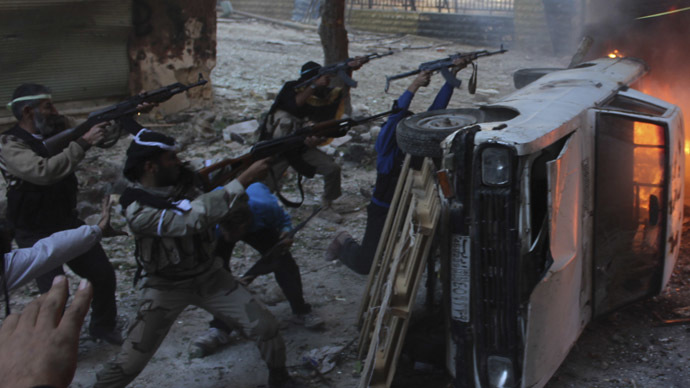Russia’s Foreign Minister has criticized the US for its inability to bring the Syrian opposition to the Geneva II peace conference and for trying to shift the responsibility for the currently stalled negotiations on Russia.
“It is strange to hear repeated statements by some US state department officials that we are moving towards Geneva II, but it’s important that Russia puts pressure on Damascus. They are shifting the blame. We are actually putting pressure on Damascus, and it really works” Sergey Lavrov said on Monday after the talks with Honduran Foreign Minister Mireya Aguero.
The Russian Foreign Minister pointed at the fact that it’s the Syrian National Council which refused to take part in the peace conference. And the US was responsible for compelling it to participate.
"The main obstacle to this endeavor is still the inability of our partners to force the Syrian opposition, whom they are supporting, to come to Geneva and sit down at the negotiating table with the government in order to find ways out of this crisis by general consent," Sergey Lavrov said as cited by Interfax.
Kerry reiterated the US position that President Bashar Assad
should resign, a demand very much in tune with the demands of the
Syrian opposition, which has said his departure is a precondition
for a peace conference.
"We believe that President Assad has lost the legitimacy
necessary to be a cohesive force that could bring people
together," Reuters reported Kerry as saying. "There has to
be a transition government in Syria to permit the possibility of
peace."
Both Kerry and Lavrov have called on all sides to set an exact
date for the talks as soon as possible. Russia’s Foreign Minister
said that "only the Jihadists can win in case of delay."
He believes that if the peace process does not start in Syria the
consequences will be grave and far-reaching.
“It’s more than just a tangle of controversies inside this country. We are seeing here underground processes, which are quite destructive, spreading throughout the Middle East and North Africa” Lavrov said. “If it keeps going on like this and if the peace process does not materialize, the consequences will be felt far outside the region.”
The prospect of Geneva-2 peace negotiations was called into
question on Sunday, when the Syrian National Council, a major
opposition group announced it would not participate in the
talks.
The announcement was followed by a series of blasts in Damascus, including a mortar attack on
Syrian TV. Experts believe the escalation of violence at the time
when the UN inspectors are working in the country, could be used
by rebel fighters to disrupt the peace process.
On Monday Syria officially became a member of the Organization
for the Prohibition of Chemical Weapons (OPCW). A week ago,
Damascus began destroying the first chemical weapons which,
according to the US-Russian deal made during Geneva talks in
September, have to be fully eliminated by June 30, 2014.
Geneva-2 is a much delayed follow-up to an earlier round of talks
on Syria, which were held in June 2012. Back then Russia and the
United States agreed on having a second peace conference.
However, that kept getting postponed, mostly because of the
Syrian opposition being divided on whether it should participate.

